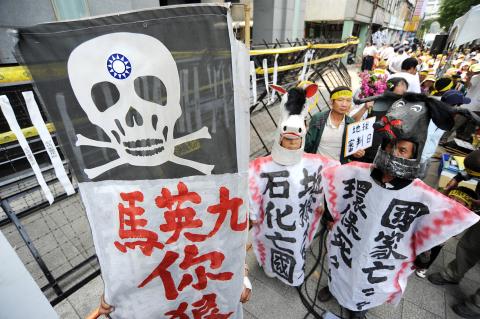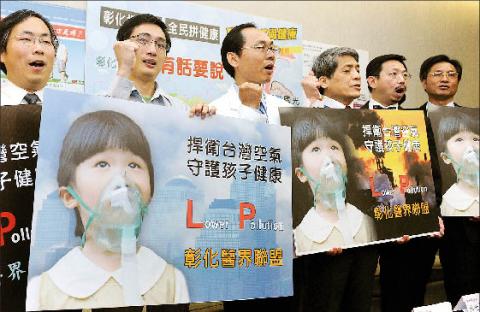The Environmental Protection Administration’s environmental impact assessment (EIA) committee yesterday failed to reach a conclusion on a proposed Kuokuang Petrochemical Technology Co (國光石化) naphtha cracker complex despite a marathon nine-hour discussion.
The committee will meet again today on whether to greenlight the complex being built in a wetland area in Changhua County.
At the last committee meeting on Jan. 28, Kuokuang was told it had to submit additional information about the project, which had been scaled back from its original proposal.

Photo: Lo Pei-der, Taipei Times
Yesterday’s meeting began with Kuokuang’s report about the possible impact of the reduced project — which would be constructed on a man-made island — on air pollution, health risks, changes to coastal geography, the endangered Indo-Pacific humpback dolphins and the area’s water supply.
The report concluded that the air pollution produced by the complex would be within regulation limits, the energy consumed could be reduced and that the plants that pose a higher health risk would be located further from land. The report said the plant would not extract groundwater, so it would not affect land subsidence, while protection of dolphins could be improved by setting up a foundation.
The report said the total economic benefits of the project could reach NT$286.2 billion (US$9.86 billion), larger than the external cost of NT$21.8 billion to NT$32.7 billion, and could provide more job opportunities.

Photo: Liao Chen-huei, Taipei Times
However, Lin Lien-tsung (林連宗), a resident of Changhua’s Fangyuan Township (芳苑), asked where the water supply would come from if a proposed diversion weir did not pass its own EIA.
Hsu Li-yi (許立儀), a resident of Dacheng Township (大城), said her family has lived in the area for generations, but she did not want her children to grow up on polluted land between two petrochemical sites in Yulin and Changhua counties.
Chen Chi-chung (陳吉仲), a National Chung Hsing University professor, said the company overestimated the plant’s benefits in its report. A recalculation of the possible health risks and medical costs would make the costs outweigh the benefits, Chen said.
The director of Yunlin County Government’s Economic Affairs Department, Huang Chiung-ya (黃瓊雅), said the petrochemical complex built by Formosa Plastics Group in Mailiao Township (麥寮) had severely polluted the environment, raising the risk of cancer for area residents and causing three accidents in the past two years.
Huang, representing Yunlin County Commissioner Su Chih-fen (蘇治芬), urged the committee members to consider their professional expertise and their conscience, and reject Kuokuang’s application to prevent the same kind of tragedy happening in Changhua.
Chan Chang-chuan (詹長權), a National Taiwan University professor, said that if members of the EIA panel were to use “environmental protection” as the professional standard in reviewing the case, then Kuokang’s application should be rejected because there is enough evidence that the plant would clearly impact the environment, society and residents’ health.
Approving the project would be a mistake and a violation of environmental justice, he said.
Meanwhile, outside the EPA’s headquarters, hundreds of Changhua County residents and students from universities nationwide, protested against the proposed plant’s negative impact on the environment and residents.
They said they hoped the panel would reject the project.
The students held mockups of newspapers bearing headlines proclaiming that the Kuokuang project had been canceled.
The mockups, dated April 22, had mastheads reading “United Oyster News” and “Oyster Times,” and were designed to show support for oyster farmers in Changhua whose livelihood is expected to be affected should the project be built.
“We cannot accept that the project will be approved, even conditionally, because the external costs are too high to be absorbed by the environment,” said Tsai Pei-hui (蔡培慧), a teacher at Shih Hsin University and the organizer of the mock newspapers..
At a separate setting, Democratic Progressive Party (DPP) lawmakers also called on the government to drop the project, citing environmental and health concerns.
Construction of the facility would also run counter to the government’s pledge to reduce carbon emissions, they said.
The proposed site — a protected wetlands — was the “kidney of Taiwan,” DPP Legislator Gao Jyh-peng (高志鵬) said.
“The DPP caucus is resolutely opposed to building a petrochemical plant there,” he said.
The DPP’s presidential hopefuls have also unanimously expressed disapproval of the project.
Tsai Ing-wen (蔡英文) said earlier this month that she hoped the facility could be built in or nearer to oil-producing regions in the Middle East, such as Saudi Arabia.
However, government agencies have sent mixed messages on the idea of building the plant overseas.
James Tien (田中光), director-general of the Ministry of Foreign Affairs’ Department of East Asian and Pacific Affairs, yesterday said that Malaysia and Indonesia were among a number of Southeast Asian countries that have expressed an interest in the Kuokuang project.
However, these countries have not submitted any substantial plans for hosting the project, Tien said.
ADDITIONAL REPORTING BY VINCENT Y. CHAO, SHIH HSIU-CHUAN AND CNA

The CIA has a message for Chinese government officials worried about their place in Chinese President Xi Jinping’s (習近平) government: Come work with us. The agency released two Mandarin-language videos on social media on Thursday inviting disgruntled officials to contact the CIA. The recruitment videos posted on YouTube and X racked up more than 5 million views combined in their first day. The outreach comes as CIA Director John Ratcliffe has vowed to boost the agency’s use of intelligence from human sources and its focus on China, which has recently targeted US officials with its own espionage operations. The videos are “aimed at

STEADFAST FRIEND: The bills encourage increased Taiwan-US engagement and address China’s distortion of UN Resolution 2758 to isolate Taiwan internationally The Presidential Office yesterday thanked the US House of Representatives for unanimously passing two Taiwan-related bills highlighting its solid support for Taiwan’s democracy and global participation, and for deepening bilateral relations. One of the bills, the Taiwan Assurance Implementation Act, requires the US Department of State to periodically review its guidelines for engagement with Taiwan, and report to the US Congress on the guidelines and plans to lift self-imposed limitations on US-Taiwan engagement. The other bill is the Taiwan International Solidarity Act, which clarifies that UN Resolution 2758 does not address the issue of the representation of Taiwan or its people in

US Indo-Pacific Commander Admiral Samuel Paparo on Friday expressed concern over the rate at which China is diversifying its military exercises, the Financial Times (FT) reported on Saturday. “The rates of change on the depth and breadth of their exercises is the one non-linear effect that I’ve seen in the last year that wakes me up at night or keeps me up at night,” Paparo was quoted by FT as saying while attending the annual Sedona Forum at the McCain Institute in Arizona. Paparo also expressed concern over the speed with which China was expanding its military. While the US

SHIFT: Taiwan’s better-than-expected first-quarter GDP and signs of weakness in the US have driven global capital back to emerging markets, the central bank head said The central bank yesterday blamed market speculation for the steep rise in the local currency, and urged exporters and financial institutions to stay calm and stop panic sell-offs to avoid hurting their own profitability. The nation’s top monetary policymaker said that it would step in, if necessary, to maintain order and stability in the foreign exchange market. The remarks came as the NT dollar yesterday closed up NT$0.919 to NT$30.145 against the US dollar in Taipei trading, after rising as high as NT$29.59 in intraday trading. The local currency has surged 5.85 percent against the greenback over the past two sessions, central